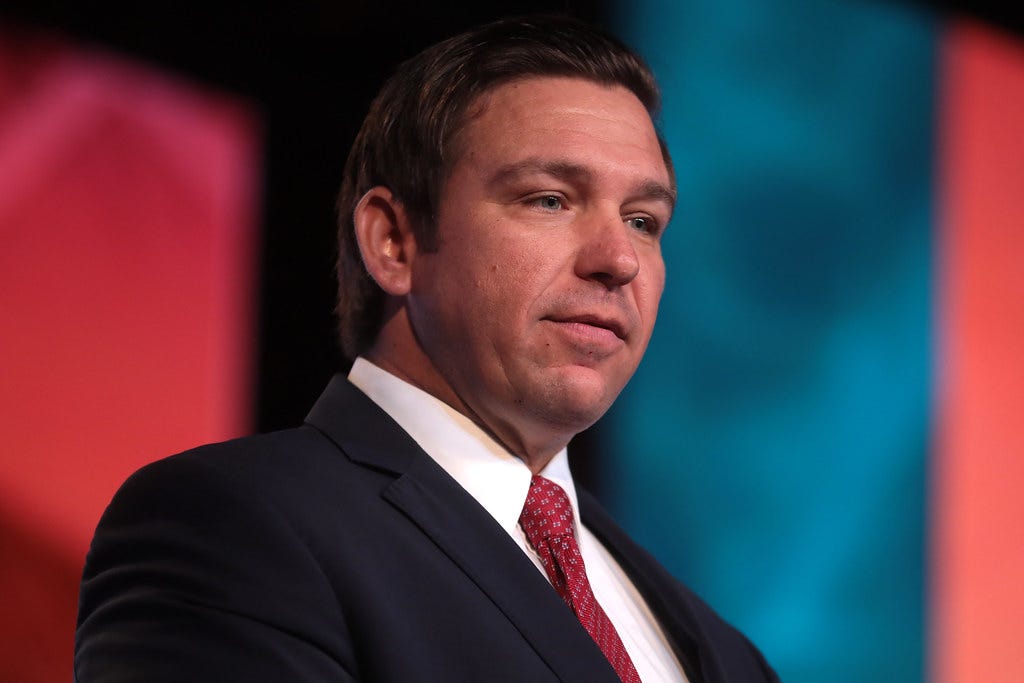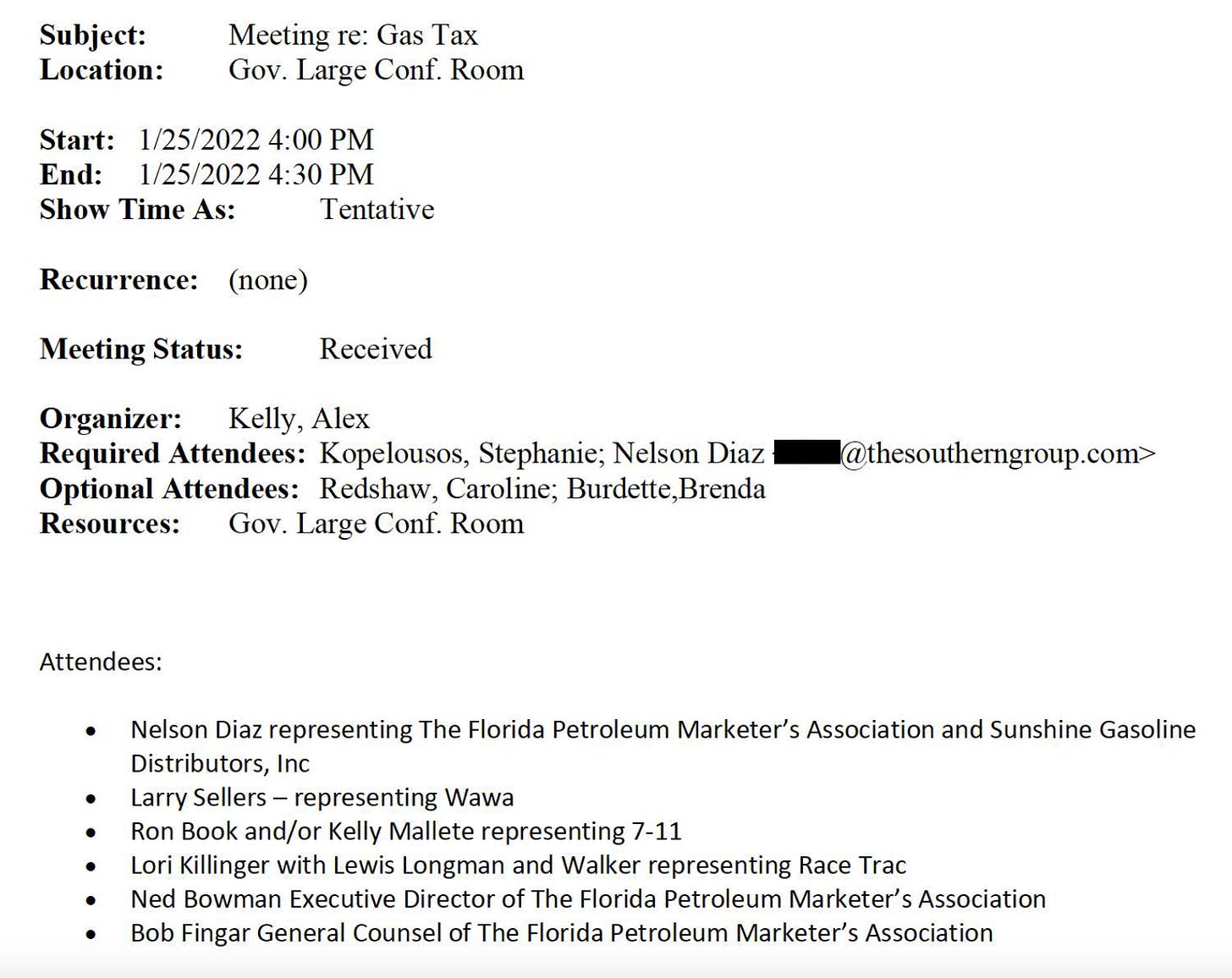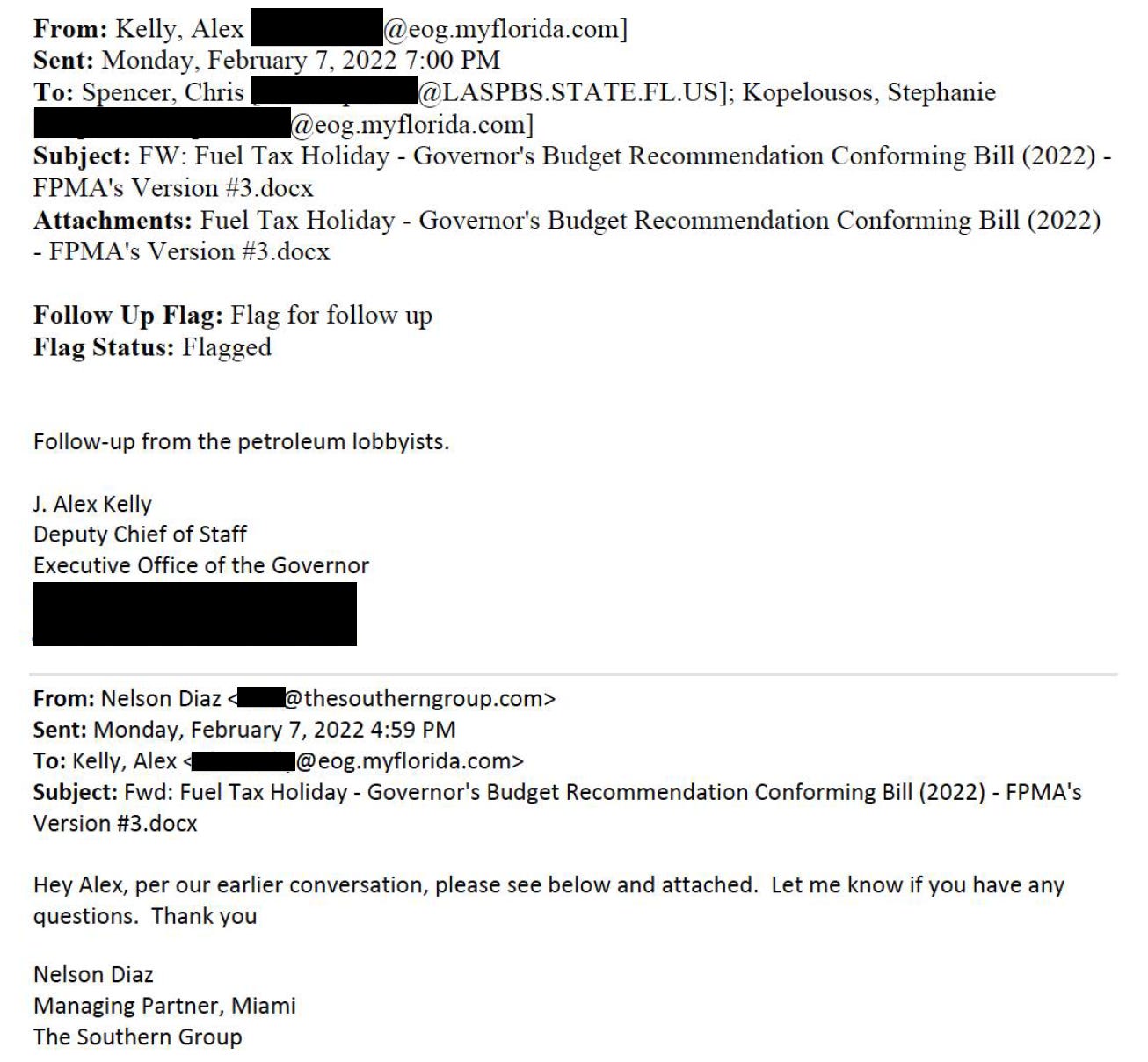Ron DeSantis worked with gas-station lobbyists who wanted to weaken a gas-tax break for consumers
Gas-station lobbyists urged Florida's governor not to push criminal penalties for stations that failed to pass tax savings on to Florida drivers during a gas-tax 'holiday.' They got their wish.

This is Seeking Rents, a newsletter and podcast devoted to producing original journalism — and lifting up the journalism of others — that examines the many ways that businesses influence public policy across Florida, written by Jason Garcia. Seeking Rents is free to all. But please consider a voluntary paid subscription, if you can afford it, to help support our work.
Just before the start of this year’s session of the Florida Legislature, Gov. Ron DeSantis publicly unveiled a plan to suspend the state’s tax on gasoline — a temporary tax “holiday” that the governor said would bring badly needed relief to Floridians struggling with rising prices at the pump.
And to make sure that this tax break was truly passed on to Florida drivers, the governor proposed a harsh penalty for any fuel supplier or gas station tempted to pocket the tax savings themselves: Third-degree felony charges, punishable by up to five years in prison.
But a few weeks later, according to emails obtained through a public-records request, lobbyists representing some of the largest gas station chains in the country privately sent a rewritten version of the governor’s proposed gas-tax holiday to one of DeSantis’ senior aides. The lobbyist version of the bill removed any threat of criminal punishment for failing to pass the tax savings on to consumers.
The emails don’t show how DeSantis or his staff reacted to the request, and the Governor’s Office declined to answer questions about it.
But when the legislative session ended, and DeSantis triumphantly signed his gas-tax holiday into law, the proposed felony penalties had disappeared.
DeSantis’ gas-tax holiday didn’t actually occur until October (a politically advantageous delay that separate records show was suggested by the governor’s own staff). But when it did, the month-long tax holiday produced an estimated $214 million in tax savings.
Experts say much of that money was swallowed up by suppliers.
Making it through the middleman
If you want to save money for Florida consumers, cutting the gas-tax is not a great way to go about it. That’s because there are a bunch of middlemen standing in the way.
The gas tax is technically paid by fuel suppliers, who buy the fuel in bulk from refineries and have it shipped or piped to storage terminals in Florida. The fuel suppliers build the cost of the tax into the price they charge gas stations. And the gas stations then bundle the tax into the price they charge drivers.
It’s an incredibly opaque process. Gas stations don’t separately state the amount of the tax. All drivers see is the single, overall price listed at the pump — a price that bounces around from one day to the next, based on global factors.
So a big challenge with a gas-tax holiday is ensuring the tax savings make it all the way downstream to drivers.
It doesn’t always work out. Earlier this year, for instance, a study by economists at the University of Pennsylvania found that just 72 percent of the savings was passed on to consumers during a recent gas-tax holiday in Maryland. As little as 58 percent of the savings made it to motorists during a gas-tax holiday in Georgia.
“Based on our study, we don’t find the entire tax decrease was passed on to consumers,” Zheli He, an economist at Penn’s Wharton School of business, told CNN in June. “The rest of it was captured by distributors.”
Disappearing penalties
Ron DeSantis may have had this problem in mind when he unveiled the details of his proposed gas-tax holiday to the public last December, during a press conference in December to present his recommended budget for the state’s 2022-23 fiscal year.
“It is unlawful for a terminal supplier, wholesaler, importer, reseller or retail dealer of motor fuel to retain any part of the tax reduction set forth in this act or to interfere with providing the full benefit of the tax reduction to the retail purchaser of motor fuel,” the governor’s proposal read. “Any person violating the provisions of this act commits a felony of the third degree.”
But then the gas-station lobby went to work.
Emails obtained through a public-records request show that senior aides to the governor convened a meeting with gas-station lobbyists on Jan. 25. That was two weeks into the 60-day lawmaking session of the Florida Legislature, which would have to pass a bill authorizing DeSantis’ gas-tax holiday.
The invitees included lobbyists for RaceTrac, 7-Eleven, Wawa, and Sunshine Gasoline Distributors, a Miami-based company that owns roughly 400 stations around the state. Lobbyists for the Florida Petroleum Marketers Association, which represents the gas-station industry as a whole, were also invited.
Some of the companies are substantial DeSantis donors. Campaign-finance records show that RaceTrac, for instance, has given at least $175,000 to the governor over the past four years. Wawa gave $25,000 just last month.
Sunshine Gasoline has donated at least $125,000 to DeSantis. Affiliated companies have also flown the governor around on their private plane, according to a recent investigation by the Orlando Sentinel’s Jeffrey Schweers.
Two weeks after that meeting, one of those lobbyists emailed Alex Kelly, a deputy chief of staff in the governor’s office, with the proposed rewrite of the gas-tax holiday.
Among other suggestions, they recommended that enforcement of the gas-tax holiday — and its requirement that fuel suppliers and gas stations pass the tax savings on to consumers — be handled as a civil matter, rather than a criminal one.
The gas-station lobbyists suggested that a station or supplier caught breaking the law could be punished with a fine of up to $25,000 — rather than a prison term of up to five years.
Kelly forwarded the recommendations on to two other top DeSantis aides: Stephanie Kopelousos, the governor’s director of legislative affairs, and Chris Spencer, his director of policy and budget.
“Follow-up from the petroleum lobbyists,” Kelly wrote.
The emails were obtained as part of a relatively narrow records request. It was primarily seeking communications between DeSantis staffers and representatives of a for-profit affordable housing developer with whom the governor’s office worked with this past session on a proposal that would have made it easier for the developer to convert rent-restricted housing for lower-income folks into higher-priced, market-rate apartments.
These emails don’t reveal what happened next with the governor’s gas-tax holiday. Kelly, Kopelousos and Spencer all declined to comment.
But the next time the details of the gas-tax holiday legislation surfaced in public — during the final days of the session — the proposed felony penalties had been removed from the bill.
That’s not all. The $25,000 fines that the gas-station lobbyists had floated as a potential compromise were nowhere to be found, either.
And another penalty that DeSantis’ office had suggested in its original version of the legislation — a provision threatening to revoke the licenses of uncooperative fuel suppliers or gas stations — was gone, too.
So to recap:
Ron DeSantis and the Florida Legislature passed a month-long gas-tax holiday in which they ordered fuel suppliers and gas stations to pass all the tax savings on to consumers. But they didn’t threaten those suppliers and stations with any specific punishment if they failed to comply.
And then, lo and behold:
“Oil suppliers got best of Florida’s gas-tax ‘holiday,’ experts say.”






